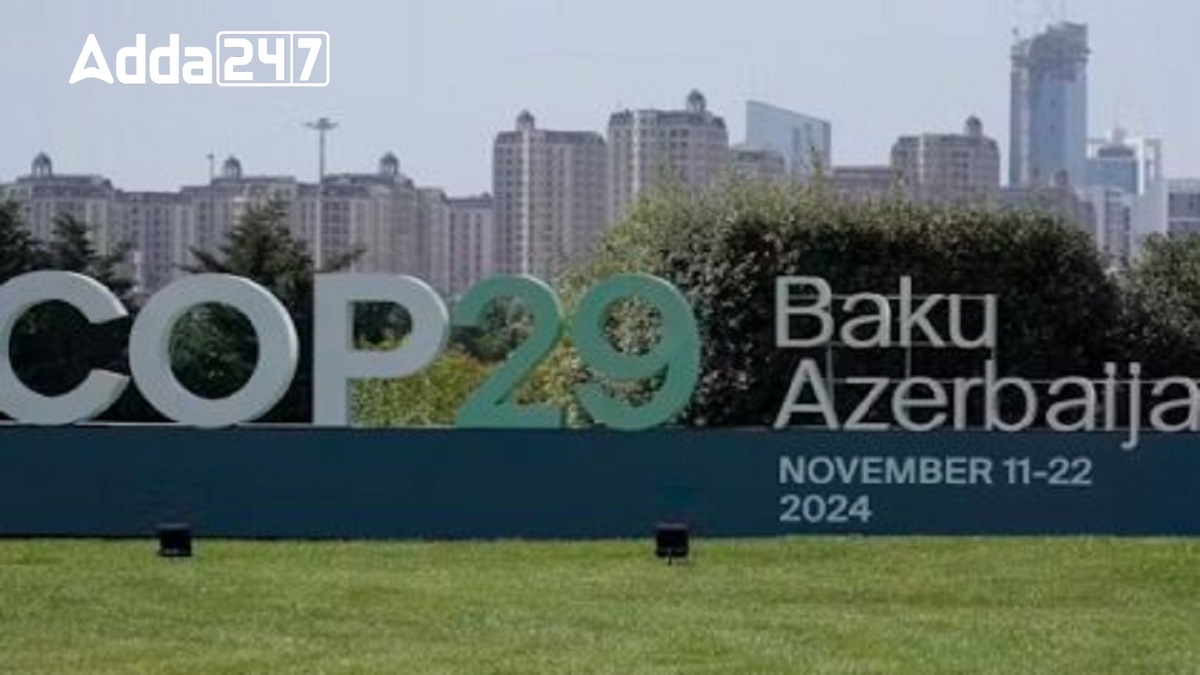The 29th UN Climate Summit, COP29, kicked off in Baku, Azerbaijan, on November 11, 2024, with discussions set to focus on vital climate finance mechanisms, particularly the new “New Collective Quantified Goal” (NCQG). The summit, running until November 22, aims to address urgent global climate issues and secure financial commitments to assist developing nations in combating the devastating effects of climate change, caused largely by greenhouse gas emissions. COP29 has been dubbed the “Finance COP” due to its central focus on financial strategies, including a push for greater funding commitments and the role of the private sector in driving climate action.
Financial Commitments and Global Cooperation
COP29’s key agenda is to secure agreements on climate finance, addressing the historic failure to meet previous funding targets. In 2009, developed countries pledged $100 billion annually for climate finance at COP15 in Copenhagen, but these commitments have not been fully realized. This year, the focus is on achieving a substantial increase in funding to support developing nations transitioning to clean energy and building resilience to climate impacts. However, critics question who should contribute and how wealthy countries can be held accountable for their promises. The summit also aims to expand adaptation finance to enhance climate resilience in vulnerable countries.
The Role of Carbon Markets and Emission Targets
A critical issue for COP29 is the progress on carbon markets, especially on whether nations can use carbon trading systems to meet their emission reduction targets under the Paris Agreement. Talks on this topic have stalled for years, but some analysts view advancements on carbon trading as essential for accelerating the global shift from fossil fuels. Another significant milestone will be the announcement of updated national emission reduction goals, with countries like Brazil, the UK, and the UAE set to announce new targets during the summit.
Geopolitical Challenges and the Trump Factor
The COP29 talks are clouded by geopolitical tensions, especially with the re-election of US President Donald Trump, who has been a climate change skeptic. His administration’s stance on climate action will likely affect global cooperation at the summit. Additionally, ongoing global conflicts, such as the war in Ukraine and the situation in Gaza, present further hurdles to achieving international climate agreements. Azerbaijan has called for a “truce” to help focus on climate solutions during the conference.
What Success Looks Like
Success at COP29 will hinge on achieving a comprehensive climate finance agreement, particularly the NCQG, and advancing cooperation on carbon trading. While new financial commitments are critical, the true measure of success would be clear and ambitious emissions targets from major nations, alongside a strong, collective commitment to moving away from fossil fuels. The pressure is on, as the window to limit global warming to 1.5°C is rapidly closing, and immediate action is needed to prevent further irreversible damage from climate change.
The Road Ahead: Urgency and Global Action
COP29 presents a final opportunity for nations to set their emission reduction targets before the February 2025 deadline. With climate impacts intensifying and the need for bold action greater than ever, the summit’s outcome could determine the future trajectory of global climate efforts. Despite the challenges, COP29 is an essential step toward securing the international cooperation necessary to mitigate the climate crisis.
COP summits along with their respective locations
| COP Summit | Year | Location |
|---|---|---|
| COP1 | 1995 | Berlin, Germany |
| COP2 | 1996 | Geneva, Switzerland |
| COP3 | 1997 | Kyoto, Japan |
| COP4 | 1998 | Buenos Aires, Argentina |
| COP5 | 1999 | Bonn, Germany |
| COP6 | 2000 | The Hague, Netherlands |
| COP7 | 2001 | Marrakech, Morocco |
| COP8 | 2002 | New Delhi, India |
| COP9 | 2003 | Milan, Italy |
| COP10 | 2004 | Buenos Aires, Argentina |
| COP11 | 2005 | Montreal, Canada |
| COP12 | 2006 | Nairobi, Kenya |
| COP13 | 2007 | Bali, Indonesia |
| COP14 | 2008 | Poznań, Poland |
| COP15 | 2009 | Copenhagen, Denmark |
| COP16 | 2010 | Cancun, Mexico |
| COP17 | 2011 | Durban, South Africa |
| COP18 | 2012 | Doha, Qatar |
| COP19 | 2013 | Warsaw, Poland |
| COP20 | 2014 | Lima, Peru |
| COP21 | 2015 | Paris, France |
| COP22 | 2016 | Marrakech, Morocco |
| COP23 | 2017 | Bonn, Germany |
| COP24 | 2018 | Katowice, Poland |
| COP25 | 2019 | Madrid, Spain |
| COP26 | 2021 | Glasgow, United Kingdom |
| COP27 | 2022 | Sharm El Sheikh, Egypt |
| COP28 | 2023 | Dubai, United Arab Emirates |
| COP29 | 2024 | Baku, Azerbaijan |
Summery of the News
| Why in News | Key Points |
|---|---|
| COP29 Summit held in Baku, Azerbaijan (Nov 11-22, 2024) | COP29 focused on climate finance for developing nations, specifically the New Collective Quantified Goal (NCQG). |
| COP29 dubbed the “Finance COP” | The primary goal is to secure financial commitments to help vulnerable nations cope with climate impacts. |
| Climate finance commitment issues | Developed countries committed $100 billion annually in 2009, but targets have not been met. |
| Climate finance for developing nations | Estimated $580 billion needed by 2030 to cover climate-induced loss and damage. |
| COP29 agenda: carbon markets | Discussions on carbon markets and whether nations can use carbon trading to meet Paris Agreement targets. |
| US Election Impact | Re-election of US President Donald Trump could impact global climate cooperation. |
| National emission targets | Nationally Determined Contributions (NDCs) due in February 2025 for new emission reduction goals. |
| Host country: Azerbaijan | Capital: Baku |
| COP29 controversial venue | Critics point to Azerbaijan’s human rights record and its status as a “petro-state” for hosting. |
| Australia’s role in COP31 | Australia and Pacific nations may host COP31 in 2026. |
| Success indicators for COP29 | Financial agreements, carbon market progress, and emissions targets are key outcomes. |
| UN Framework Convention on Climate Change (UNFCCC) | COP29 involves nearly 200 nations as part of the UNFCCC framework. |




 PM Modi Unveils India AI Impact Expo 202...
PM Modi Unveils India AI Impact Expo 202...
 India To Hosts First-Ever Global South A...
India To Hosts First-Ever Global South A...
 Bharat Bodhan AI Conclave 2026 Kicks Off...
Bharat Bodhan AI Conclave 2026 Kicks Off...








